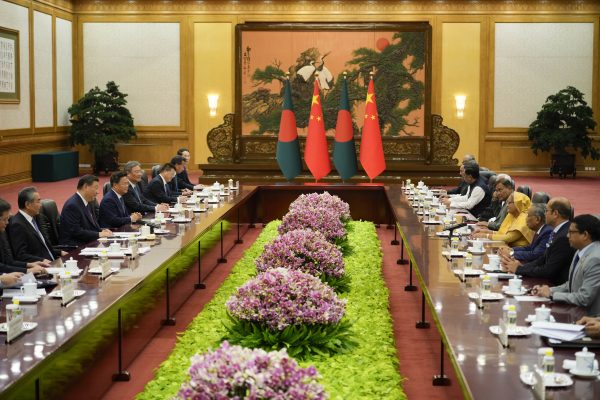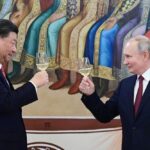The article examines Bangladesh’s shifting position in its strategic balancing act between China and India. Key points include:
In summary, Bangladesh’s foreign policy is currently under strain as it tries to balance the growing influence of China with its historical ties to India, navigating the complexities of regional geopolitics and economic dependencies.
Bangladeshi Prime Minister Sheikh Hasina last week concluded an official visit to China, a few weeks after visiting the closest neighbor, India, from June 21-22. Hasina and her ruling Awami League have been getting all-out political support from New Delhi for over 15 years, and her trips to China and India were closely watched by diplomats in the other country.
Hasina went to China with a jumbo delegation of 196 members, including her Cabinet colleagues, top government officials, and business leaders, among others.
Bangladesh’s topline expectation from this visit was securing a $5 billion loan as budget support, mainly to replenish the country’s dwindling foreign currency reserve.
Bangladesh and China have an annual bilateral trade turnover of $23 billion. Of that, less than $1 billion is accounted for by Bangladeshi exports to China; the vast majority is Bangladesh’s imports. The trade deficit with China has been putting pressure on Bangladesh’s foreign currency reserves, which are already struggling to stay afloat amid the inflation sparked by the Russia-Ukraine war. The government was forced to cut down monthly imports to below $5 billion from a usual over $8 billion a month in the past to cope with the pressure on the forex reserve.
Before Hasina’s visit to China, government officials of the two nations negotiated for several weeks over Bangladesh’s request to get $5 billion worth of Chinese yuan as budget support so that pressure on Dhaka’s forex reserve lessens. However, things did not advance as expected. China showed interest in providing the sum as a trade facility with a high interest rate, while Bangladesh was seeking it as low-cost budget support.
The situation did not change during Hasina’s days in Beijing from July 8-10. A dramatic announcement of budget support from the Chinese side was expected by many officials of the government. However, the Bangladeshi premier returned from China almost empty-handed in terms of monetary gain. China announced a financial assistance of 1 billion yuan, which is merely $137 million.
Hasina returned home early from the trip, which many media outlets took as a sign of her displeasure with the outcomes.
However, Hasina does not think that her China visit was fruitless since Bangladesh and China signed 21 memorandums of understanding (MoUs) on the occasion. On Sunday, at a press briefing following her China tour, she said that she had talks with Chinese President Xi Jinping who agreed to provide $2 billion to Bangladesh in the form of “grants, interest-free loans, concessional loans and commercial loans.” But the joint statement issued at the conclusion of her visit made no mention of such a deal, and it’s unclear how much money would be provided via each funding channel.
Experts and political analysts believe that Hasina’s “excessive devotion” to India is behind China’s unwillingness to cooperate with Bangladesh on the loan program. The Bangladeshi premier visited India just before visiting China and has made many commitments of bilateral cooperation including rail transit to India through Bangladeshi territory. Dhaka has also agreed to implement the Teesta River Comprehensive Management and Restoration Project with Indian assistance, which hurt China’s interests.
China had already announced a $1 billion fund to implement the Teesta water project under India’s nose. However, Bangladesh was hesitant whether India would allow this to happen, and thus did not give a final nod to the Chinese-funded project. A few months back India entered into the scene and announced its interest to fund the same project for which China had already conducted a feasibility study.
India’s expression of interest in the Teesta water project meant that China would be pushed out from the scene, which happened during Sheikh Hasina’s India visit. At the conclusion of her visit the two sides declared: “As part of our development cooperation, we will also undertake conservation and management of Teesta River inside Bangladesh with Indian assistance within a mutually agreed timeframe.” This has put the last nail in the coffin of the prospect of China’s engagement with the project, which to some extent strained the bilateral relations.
As Bangladesh’s economy is undergoing a tough time and no signs are visible for immediate recovery, experts also opine that China is now somewhat skeptical about Bangladesh’s economy, and thus hesitant to extend the loan facility as sought. Since March last year, China has not provided any new loans to Bangladesh. In 2016 China pledged to provide $24 billion in loans to Bangladesh across 34 projects but so far the two sides have signed deals for only $5.61 billion.
“When a country becomes poor, friends do not remain beside her. We didn’t get much from China and India,” Ahsan H. Mansur, executive director of the Policy Research Institute of Bangladesh, told a local newspaper.
He said that budget support in Chinese yuan amounting to the equivalent of $5 billion could have covered the cost of imports from China, which may have helped Bangladesh to save previous dollars. India was also supposed to offer a new Line of Credit (LoC) but that has not materialized, either.
Had Bangladesh secured these loans, the forex reserve could have increased by $4 billion or $5 billion, said Mansur, who is also a former senior official of the International Monetary Fund (IMF).
M. Humayun Kabir, a former ambassador of Bangladesh to the United States, also echoed Mansur’s views. He said the expectation of getting financial support from China has to take into consideration Bangladesh’s ongoing economic crisis. “I think China is also observing it,” Kabir said. “They will give money if the [economic] management is good. If the management is not good, any lender will be hesitant in this case.”
During Hasina’s China visit, he noted, there was a lot of hype but the outcome fell short of expectations. “We did not see anything about budget support, also nothing has been done about trade facilitation, and [there was] no concrete promise made about Payra port area development,” Kabir pointed out.
Prior to the trip, officials told Bangladeshi media that infrastructure development centering on Payra port would be the focus of “special attention” during Hasina’s visit.
Kabir argued that China is many times more powerful than India in terms of its ability to offer financial and economic benefits. “But I think, their own assessment about our ability, and the state of our financial management worked as factors behind not granting budget support,” he concluded.
That said, Kabir said a few positive developments came out of Hasina’s trip to China, which include the conclusion of a free trade agreement (FTA) study, continuation of duty free facilities even after Bangladesh’s graduation from “least developed country” status, opening branches of some Chinese banks in Bangladesh to facilitate trade transaction, and Chinese help in Rohingya repatriation. “The achievements are more futuristic than in the present,” he noted.
As for Sheikh Hasina’s India visit, Kabir said India has definitely gained in the short term, but it is also not possible to say where the achievements will stand in the long term. Bangladesh got some positive indications about a possible extension of the Ganges water-sharing deal and some other economic assistance, as well as the potential of getting direct access to Nepal and Bhutan.
Indian interest in the Teesta water management is a new development “but I am not sure how it will shape up in the future.” India’s government has long balked at a formal water-sharing agreement over the Teesta due to political opposition in West Bengal state. A breakthrough on the issue depends on political will, Kabir said, adding it is difficult to make a comparison about gains and losses.
“In my view, the visit was directed towards India strengthening its strategic vision both on the land and on the sea. They wanted to get Bangladesh and we have in many cases endorsed their expectations,” he told The Diplomat.
Md. Touhid Hossain, a former foreign secretary of Bangladesh, told The Diplomat that China has seriously taken the rail transit access granted to India by Bangladesh as well as the development over the Teesta water management project.
After the World Bank withdrew funding from the Padma Bridge, China helped Bangladesh to construct the bridge, which sports a four-lane highway on the upper level and a single-track railway on the lower level. Now that India has been granted rail transit, in the coming days trains laden with goods will travel through the Padma rail bridge to India’s landlocked northeastern region, which China did not take well.
Hossain said that during her India trip, apart from delegation-level meetings Hasina had a one-on-one meeting with India’s Prime Minister Narendra Modi where it is believed he raised Indian concerns – including the Teesta water project. The Teesta project area is close to India’s strategically important Northeast, thus India is not comfortable with China undertaking the work. For security reasons Indian officials do not want to see a large group of Chinese nationals stay and work for a long time in the Teesta water project area. Thus it became clear before Hasina’s arrival in Beijing that China has been excluded from the Teesta project.
As a result, Bangladesh made little progress on the economic issues like budget support and project loans that its government had prioritized ahead of Hasina’s China visit. The 1 billion yuan China granted to Bangladesh as assistance is a very small amount compared to the country’s present need.
“We don’t see any mentionable achievements from the China visit,” Hossain said, asserting that the MoUs signed during the trip are of no importance.
If any country is going to maintain geopolitical balance, it needs some leverage, he explained – which Bangladesh does not have now.
In the past, it was assumed that Bangladesh had been maintaining a kind of balance in relations with China and India. But many analysts feel the country is no longer at that point, as Bangladesh is showing much more interest in meeting Indian needs. China may have come to the same conclusion.
“We have become more prone to India in terms of the geopolitical point of view. Because we have taken many decisions recently despite knowing that China will be unhappy,” Hossain said.
“We have recently come out from maintaining a balanced relation with China and India,” he concluded, adding: “We are not getting any scope to keep China under consideration [while] meeting India’s expectations.”







